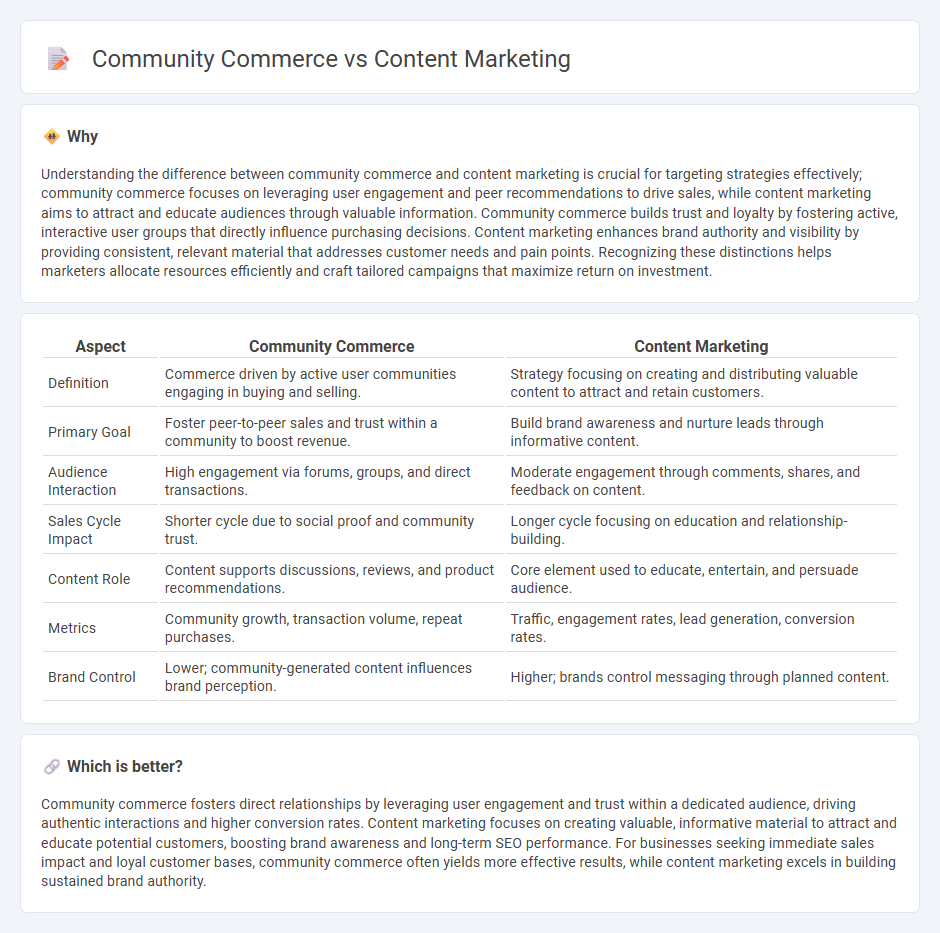
Community commerce leverages the power of engaged groups to drive sales through authentic interactions and shared interests, fostering long-term brand loyalty. Content marketing focuses on creating valuable, relevant content to attract and retain a clearly defined audience, enhancing brand awareness and trust. Explore how blending these strategies can maximize your marketing impact and customer engagement.
Why it is important
Understanding the difference between community commerce and content marketing is crucial for targeting strategies effectively; community commerce focuses on leveraging user engagement and peer recommendations to drive sales, while content marketing aims to attract and educate audiences through valuable information. Community commerce builds trust and loyalty by fostering active, interactive user groups that directly influence purchasing decisions. Content marketing enhances brand authority and visibility by providing consistent, relevant material that addresses customer needs and pain points. Recognizing these distinctions helps marketers allocate resources efficiently and craft tailored campaigns that maximize return on investment.
Comparison Table
| Aspect | Community Commerce | Content Marketing |
|---|---|---|
| Definition | Commerce driven by active user communities engaging in buying and selling. | Strategy focusing on creating and distributing valuable content to attract and retain customers. |
| Primary Goal | Foster peer-to-peer sales and trust within a community to boost revenue. | Build brand awareness and nurture leads through informative content. |
| Audience Interaction | High engagement via forums, groups, and direct transactions. | Moderate engagement through comments, shares, and feedback on content. |
| Sales Cycle Impact | Shorter cycle due to social proof and community trust. | Longer cycle focusing on education and relationship-building. |
| Content Role | Content supports discussions, reviews, and product recommendations. | Core element used to educate, entertain, and persuade audience. |
| Metrics | Community growth, transaction volume, repeat purchases. | Traffic, engagement rates, lead generation, conversion rates. |
| Brand Control | Lower; community-generated content influences brand perception. | Higher; brands control messaging through planned content. |
Which is better?
Community commerce fosters direct relationships by leveraging user engagement and trust within a dedicated audience, driving authentic interactions and higher conversion rates. Content marketing focuses on creating valuable, informative material to attract and educate potential customers, boosting brand awareness and long-term SEO performance. For businesses seeking immediate sales impact and loyal customer bases, community commerce often yields more effective results, while content marketing excels in building sustained brand authority.
Connection
Community commerce and content marketing intersect by fostering authentic engagement and driving customer loyalty through valuable, user-generated content. Brands leveraging community commerce harness shared experiences and social interactions to create targeted content that resonates deeply with niche audiences. This synergy enhances brand trust and amplifies organic reach, boosting conversion rates and long-term revenue growth.
Key Terms
**Content Marketing:**
Content marketing centers on creating and distributing valuable, relevant content to attract and engage a target audience, driving customer loyalty and brand awareness. Key strategies include blog posts, videos, infographics, and social media content designed to educate and inspire potential customers. Discover how content marketing can transform your brand's presence and foster long-term customer relationships.
Storytelling
Content marketing leverages compelling storytelling to engage audiences by creating valuable, relevant narratives that build brand awareness and trust. Community commerce centers storytelling within social interactions, encouraging users to share authentic experiences and foster a sense of belonging that drives collective purchasing decisions. Explore how integrating storytelling enhances both strategies to maximize customer engagement and loyalty.
SEO (Search Engine Optimization)
Content marketing leverages high-quality, keyword-rich content to improve organic search rankings and drive targeted traffic, enhancing brand visibility and engagement. Community commerce emphasizes building a loyal customer base through interactive platforms, which can generate user-generated content and backlinks, indirectly boosting SEO performance. Explore deeper strategies to optimize both approaches and maximize your digital marketing impact.
Source and External Links
What is Content Marketing? A Beginners Guide - Content marketing is the strategic creation and distribution of valuable, relevant content designed to attract and engage your target audience, building trust and driving profitable customer actions without traditional advertising.
What is Content Marketing? Definition, Examples & Benefits - Content marketing involves creating and distributing valuable, relevant, and consistent content to attract and retain a clearly defined audience, focusing on education and engagement to build brand affinity and trust.
What Is Content Marketing? - Content marketing is a strategic marketing approach focused on creating and distributing valuable, relevant, and consistent content to attract and retain a clearly defined audience, ultimately driving profitable customer action by providing useful information instead of direct product pitches.
 dowidth.com
dowidth.com